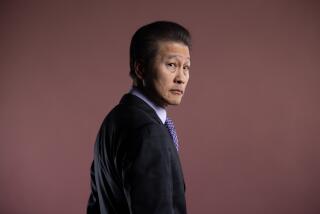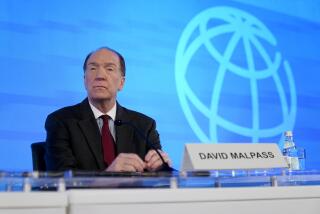World Bank welcomes new leader’s stability, philosophy
- Share via
WASHINGTON — If one thing has become clear since Robert Zoellick became World Bank president three months ago, it’s that he isn’t Paul Wolfowitz.
Wolfowitz’s stormy tenure ended in a forced resignation in May over allegations that he had arranged a sweetheart salary for his sweetheart, a World Bank employee. Zoellick, a former diplomat, U.S. trade representative and Goldman Sachs executive, was sent in by President Bush to repair the damage.
“I have been at the World Bank Group a little over three months, and I believe we have been able to calm some of the waters while starting to navigate a course ahead,” Zoellick said Thursday.
This weekend, the bank holds its first semiannual meeting since Wolfowitz’s resignation, and in many ways it will be a kind of debut for Zoellick and his ideas.
Wolfowitz antagonized World Bank staffers and finance ministers with moves seen as arrogant, including installing a Kitchen Cabinet of Bush administration aides and relentlessly pursuing an anti-corruption agenda that many saw as politically motivated.
By contrast, Zoellick has taken steps to win over the economists and technocrats at the bank. For one thing, he did not install his own personal staff. Whereas Wolfowitz placed favorites in top jobs, Zoellick did not even bring along a personal secretary. And for the few appointments he has made, he has promoted from within or named longtime bank employees.
“I think there’s a kind of honeymoon period right now,” said Bea Edwards, international projects director at the Government Accountability Project, a whistle-blower protection group that served as a conduit for staff opposition to Wolfowitz. “There are obvious differences in style. Wolfowitz did not consult people about actions he was about to take, and Zoellick is consultative. In Washington, there’s a real science to proper ‘consulting’ -- you can do nearly anything you want if the right people are consulted.”
Zoellick has spent weeks visiting member countries and collecting ideas. Recently, he has begun to lay out a vision that includes intensifying the bank’s core mission to combat global poverty by supporting development in the world’s 80 poorest countries.
“Globalization must not leave the ‘bottom billion’ behind,” Zoellick said last week. “Poverty breeds instability, disease and devastation of common resources and the environment. Poverty can lead to broken societies that can become breeding grounds of those bent on destruction, and to migrations that risk lives.”
To that end, Zoellick has doubled the amount the bank has set aside for its International Development Assn., which makes interest-free loans and grants to poor countries. And he plans to use the weekend meeting to encourage donor nations to increase their funding as well.
At the same time, Zoellick wants to increase the bank’s work with so-called middle-income countries such as China, Mexico and India -- nations that are still developing, but whose governments have access to private-sector loans. Some critics have argued that the World Bank should get out of the business of making loans to such countries.
But Zoellick noted that about 70% of the world’s poor live in those parts of the world.
“The World Bank Group needs a more differentiated business model for the middle-income countries,” Zoellick said. “Critical social services and infrastructure remain underfunded. In many cases, rapid economic growth has failed to provide opportunities for the poor. Environmental problems are acute.”
Zoellick wants the bank to focus on funding projects in these countries that increase “public goods,” such as infrastructure, health or clean air. He sees the bank playing a big role in helping China and India “integrate the needs of development and low-carbon growth.”
To demonstrate his commitment to middle-income countries, Zoellick has simplified and lowered the prices that they will pay to borrow from the International Bank for Reconstruction and Development, an arm of the World Bank. He has also put the bank to work helping these countries develop their own bonds and securities.
“He’s expansionist,” said Sebastian Mallaby, an expert on international finance at the Council on Foreign Relations. “He’s expanding in all directions.”
All of these ideas will be under discussion during the Washington meetings, although few major decisions are expected.
“The important event will be the under the radar -- Zoellick getting buy-in for his vision,” Mallaby said.
Though some worry that Zoellick might be encouraging the bank to take on too much too quickly, most staff members are just relieved to be getting back to work.
“The spring meeting agenda was hijacked by the Wolfowitz scandal,” said one employee, who like others spoke on condition of anonymity because they are nervous discussing their boss in public. “The main thing for the staff is that we’re back to work, finally, and we have a competent person at the helm.”
“He’s got the empathy of the staff,” said John Williamson, senior fellow at the Peterson Institute for International Economics. “He’s made some good speeches in which he’s articulated the sort of objectives the people inside the World Bank want to hear.”
Wolfowitz was also unpopular because of his role as an architect of the Iraq war, Williamson said. “Zoellick worked in the Bush administration,” he noted, “but I think most people [at the bank] were pretty happy with the policies he was associated with, primarily free trade.”
At a news conference Thursday, Zoellick deftly discussed matters ranging from conditional cash transfers in Brazil to Russia’s malaria remediation programs in Africa.
It remains to be seen how long the honeymoon will last, but Mallaby said Zoellick had learned from his predecessor’s mistakes and managed to distinguish himself quickly.
“He’s made a big show of wanting to engage with the staff. Partly because of that, and also because he’s a smart wonk who likes learning, he’s immensely popular at the bank,” Mallaby said. “It’s hard to find anyone who’s unhappy.”
--
More to Read
Inside the business of entertainment
The Wide Shot brings you news, analysis and insights on everything from streaming wars to production — and what it all means for the future.
You may occasionally receive promotional content from the Los Angeles Times.










